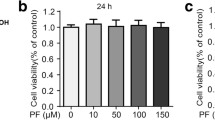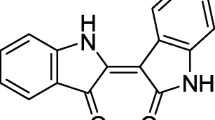Abstract
The peroxisome proliferator-activated receptor gamma (PPARγ) is a nuclear receptor highly expressed in the colon and playing an anti-inflammatory role through inhibition of the NF-κB pathway. Toll-like receptor 4 (TLR4) has been known to mediate LPS-induced cellular signaling through activation of NF-κB pathway in intestinal epithelial cells. The aims of this study were to evaluate attenuation of inflammation by PPARγ in intestinal epithelial cells and to study the possible relation between PPARγ and TLR4. HT-29 human epithelial cells were stimulated with LPS (20 μg/ml) and PPARγ ligand, 15d-PGJ2 (10 μM), or with LPS (20 μg/ml) alone for 24 hr. COX-2, IL-8, TLR4, and PPARγ mRNA expression was assessed by RT-PCR. IL-8 protein levels and TLR4 protein expression were analyzed by ELISA and Western blot, respectively. To evaluate the action mechanisms of PPARγ ligand, Western blot analysis for IκBα degradation was performed. Costimulation with LPS and PPARγ ligand in comparison to LPS stimulation alone (1) decreased COX-2, IL-8 mRNA expression and IL-8 protein secretion, (2) decreased TLR4 mRNA and protein expression, and (3) decreased PPARγ mRNA expression. PPARγ ligand delayed LPS-induced IκBα degradation. These findings suggest that PPAR-γ ligands suppress inflammation in intestinal epithelial cells. PPARγ and TLR, these two antagonistic signaling pathways in intestinal epithelial cells may be partially cross-linked.
Similar content being viewed by others
References
Schoonjans K, Martin G, Staels B, Auwerx J: Peroxisome proliferator-activated receptors, orphans with ligands and functions. Curr Opin Lipidol 8:159–166, 1997
Vamecq J, Latruffe N: Medical significance of peroxisome proliferator-activated receptors. Lancet 354:141–148, 1999
Su CG, Wen X, Bailey ST, Jiang W, Rangwala SM, Keilbaugh SA, Flanigan A, Murthy S, Lazar MA, Wu GD: A novel therapy for colitis utilizing PPAR-gamma ligands to inhibit the epithelial inflammatory response. J Clin Invest 104:383–389, 1999
Desreumaux P, Dubuquoy L, Nutten S, Peuchmaur M, Englaro W, Schoonjans K, Derijard B, Desvergne B, Wahli W, Chambon P, Leibowitz MD, Colombel JF, Auwerx J: Attenuation of colon inflammation through activators of the retinoid X receptor (RXR)/peroxisome proliferator-activated receptor gamma (PPARgamma) heterodimer. A basis for new therapeutic strategies. J Exp Med 193:827–838, 2001
Zhang G, Ghosh S: Toll-like receptor-mediated NF-kappaB activation: a phylogenetically conserved paradigm in innate immunity. J Clin Invest 107:13–19, 2001
Anderson KV: Toll signaling pathways in the innate immune response. Curr Opin Immunol 12:13–19, 2000
Akira S, Takeda K, Kaisho T: Toll-like receptors: critical proteins linking innate and acquired immunity. Nat Immunol 2:675–680, 2001
Dubuquoy L, Jansson EA, Deeb S, Rakotobe S, Karoui M, Colombel JF, Auwerx J, Pettersson S, Desreumaux P: Impaired expression of peroxisome proliferator-activated receptor gamma in ulcerative colitis. Gastroenterology 124:1265–1276, 2003
Jung HC, Eckmann L, Yang SK, Panja A, Fierer J, Morzycka-Wroblewska E, Kagnoff MF: A distinct array of proinflammatory cytokines is expressed in human colon epithelial cells in response to bacterial invasion. J Clin Invest 95:55–65, 1995
Chawla A, Barak Y, Nagy L, Liao D, Tontonoz P, Evans RM: PPAR-gamma dependent and independent effects on macrophage-gene expression in lipid metabolism and inflammation. Nat Med 7:48–52, 2001
Gupta RA, Dubois RN: Controversy: PPARgamma as a target for treatment of colorectal cancer. Am J Physiol Gastrointest Liver Physiol 283:266–269, 2002
Daynes RA, Jones DC: Emerging roles of PPARs in inflammation and immunity. Nat Rev Immunol 2:748–759, 2002
Saubermann LJ, Nakajima A, Wada K, Zhao S, Terauchi Y, Kadowaki T, Aburatani H, Matsuhashi N, Nagai R, Blumberg RS: Peroxisome proliferator-activated receptor gamma agonist ligands stimulate a Th2 cytokine response and prevent acute colitis. Inflamm Bowel Dis 8:330–339, 2002
Tanaka T, Kohno H, Yoshitani S, Takashima S, Okumura A, Murakami A, Hosokawa M: Ligands for peroxisome proliferator-activated receptors alpha and gamma inhibit chemically induced colitis and formation of aberrant crypt foci in rats. Cancer Res 61:2424–2428, 2001
Nakajima A, Wada K, Miki H, Kubota N, Nakajima N, Terauchi Y, Ohnishi S, Saubermann LJ, Kadowaki T, Blumberg RS, Nagai R, Matsuhashi N: Endogenous PPAR gamma mediates anti-inflammatory activity in murine ischemia-reperfusion injury. Gastroenterology 120:460–469, 2001
Hailman E, Lichenstein HS, Wurfel MM, Miller DS, Johnson DA, Kelley M, Busse LA, Zukowski MM, Wright SD: Lipopolysaccharide (LPS)-binding protein accelerates the binding of LPS to CD14. J Exp Med 179:269–277, 1994
Akira S, Takeda K: Toll-like receptor signalling. Nat Rev Immunol 4:499–511, 2004
Poltorak A, He X, Smirnova I, Liu MY, Van Huffel C, Du X, Birdwell D, Alejos E, Silva M, Galanos C, Freudenberg M, Ricciardi-Castagnoli P, Layton B, Beutler B: Defective LPS signaling in C3/H/eJ and C57B/L/0ScCr mice: mutations in Tlr4 gene. Science 282:2085–2088, 1998
Hoshino K, Takeuchi O, Kawai T, Sanjo H, Ogawa T, Takeda Y, Takeda K, Akira S: Cutting edge: Toll-like receptor 4 (TLR4)-deficient mice are hyporesponsive to lipopolysaccharide: evidence for TLR4 as the Lps gene product. J Immunol 162:3749–3752, 1999
Cario E, Rosenberg IM, Brandwein SL, Beck PL, Reinecker HC, Podolsky DK: Lipopolysaccharide activates distinct signaling pathways in intestinal epithelial cell lines expressing Toll-like receptors. J Immunol 164:966–972, 2000
Dubuquoy L, Dharancy S, Nutten S, Pettersson S, Auwerx J, Desreumaux P: Role of peroxisome proliferator-activated receptor gamma and retinoid X receptor heterodimer in hepatogastroenterological diseases. Lancet 360:1410–1418, 2002
Cario E, Podolsky DK: Differential alteration in intestinal epithelial cell expression of toll-like receptor 3 (TLR3) and TLR4 in inflammatory bowel disease. Infect Immun 68:7010–7017, 2000.
Author information
Authors and Affiliations
Corresponding author
Rights and permissions
About this article
Cite this article
Eun, C.S., Han, D.S., Lee, S.H. et al. Attenuation of Colonic Inflammation by PPARγ in Intestinal Epithelial Cells: Effect on Toll-like Receptor Pathway. Dig Dis Sci 51, 693–697 (2006). https://doi.org/10.1007/s10620-006-3193-0
Received:
Accepted:
Issue Date:
DOI: https://doi.org/10.1007/s10620-006-3193-0




